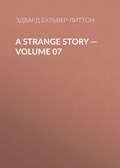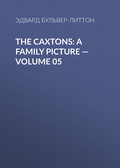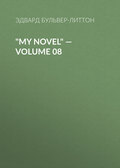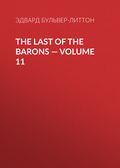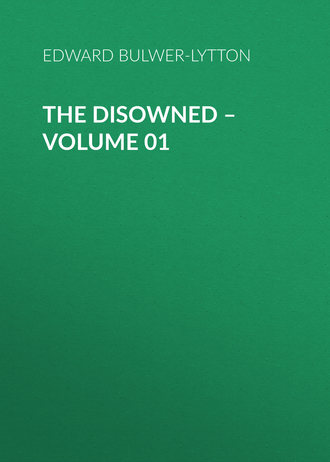
Эдвард Бульвер-Литтон
The Disowned – Volume 01
"Another time," said Clarence, hastily.
"To-morrow, at ten o'clock," muttered Mr. Brown.
"I am exceedingly glad I have got rid of that fellow," said Linden to himself, as he stretched his limbs in his easy-chair, and drank off the last glass of his pint of port. "If I have not already seen, I have already guessed, enough of the world, to know that you are to look to your pockets when a man offers you a present; they who 'give,' also 'take away.' So here I am in London, with an order for 1000 pounds in my purse, the wisdom of Dr. Latinas in my head, and the health of eighteen in my veins; will it not be my own fault if I do not both enjoy and make myself—"
And then, yielding to meditations of future success, partaking strongly of the inexperienced and sanguine temperament of the soliloquist, Clarence passed the hours till his pillow summoned him to dreams no less ardent and perhaps no less unreal.
CHAPTER VIII
"Oh, how I long to be employed!"
—Every Man in his Humour.
Clarence was sitting the next morning over the very unsatisfactory breakfast which tea made out of broomsticks, and cream out of chalk (adulteration thrived even in 17—) afforded, when the waiter threw open the door and announced Mr. Brown.
"Just in time, sir, you perceive," said Mr. Brown; "I am punctuality itself: exactly a quarter of a minute to ten. I have brought you the pots of French mustard, and I have some very valuable articles which you must want, besides."
"Thank you, sir," said Linden, not well knowing what to say; and Mr. Brown, untying a silk handkerchief, produced three shirts, two pots of pomatum, a tobacco canister with a German pipe, four pair of silk stockings, two gold seals, three rings, and a stuffed parrot!
"Beautiful articles these, sir," said Mr. Brown, with a snuffle "of inward sweetness long drawn out," and expressive of great admiration of his offered treasures; "beautiful articles, sir, ar'n't they?"
"Very, the parrot in particular," said Clarence.
"Yes, sir," returned Mr. Brown, "the parrot is indeed quite a jewel; it belonged to the late Lady Waddilove; I offer it to you with considerable regret, for—"
"Oh!" interrupted Clarence, "pray do not rob yourself of such a jewel; it really is of no use to me."
"I know that, sir,—I know that," replied Mr. Brown; "but it will be of use to your friends; it will be inestimable to any old aunt, sir, any maiden lady living at Hackney, any curious elderly gentleman fond of a knack-knack. I knew you would know some one to send it to as a present, even though you should not want it yourself."
"Bless me!" thought Linden, "was there ever such generosity? Not content with providing for my wants, he extends his liberality even to any possible relations I may possess!"
Mr. Brown now re-tied "the beautiful articles" in his handkerchief.
"Shall I leave them, sir?" said he.
"Why, really," said Clarence, "I thought yesterday that you were in jest; but you must be aware that I cannot accept presents from any gentleman so much,—so much a stranger to me as you are."
"No, sir, I am aware of that," replied Mr. Brown; "and in order to remove the unpleasantness of such a feeling, sir, on your part,– merely in order to do that, I assure you with no other view, sir, in the world,—I have just noted down the articles on this piece of paper; but as you will perceive, at a price so low as still to make them actually presents in everything but the name. Oh, sir, I perfectly understand your delicacy, and would not for the world violate it."
So saying, Mr. Brown put a paper into Linden's hands, the substance of which a very little more experience of the world would have enabled Clarence to foresee; it ran thus:—
CLARENCE LINDEN, ESQ., DR.
TO Mr. MORRIS BROWN.
l. s. d.
To Six Pots of French Mustard . . . . . . . . . 1 4 0
To Three Superfine Holland Shirts, with Cambric Bosoms,
Complete . . . . . . . . . . . . . . . . 4 1 0
To Two Pots of Superior French Pomatum . . . . . . 0 10 0
To a Tobacco Canister of enamelled Tin, with a finely
Executed Head of the Pretender; slight flaw in the same. 0 12 6
To a German Pipe, second hand, as good as new, belonging
to the late Lady Waddilove . . . . . . . . . . 1 18 0
To Four Pair of Black Silk Hose, ditto, belonging to her
Ladyship's Husband . . . . . . . . . . . . . 2 8 0
To Two Superfine Embossed Gold Watch Seals, with a
Classical Motto and Device to each, namely, Mouse Trap,
and "Prenez Garde," to one, and "Who the devil can this
be from?" [One would not have thought these ingenious
devices had been of so ancient a date as the year 17—.]
to the other . . . . . . . . . . . . . . . 1 1 0
To a remarkably fine Antique Ring, having the head of a
Monkey . . . . . . . . . . . . . . . . . 0 16 6
A ditto, with blue stones . . . . . . . . . . . 0 12 6
A ditto, with green ditto . . . . . . . . . . . 0 12 6
A Stuffed Green Parrot, a remarkable favourite of the late
Lady W. . . . . . . . . . . . . . . . . 2 2 0
––
Sum Total . . . . . . . . . . . . . . . 15 18 0
Deduction for Ready Money . . . . . . . . . . 0 13 6
––
15 4 6
Mr. Brown's Profits for Brokerage . . . . . . . . 1 10 0
––
Sum Total . . . . . . . . . . . . . . . 16 14 6
Received of Clarence Linden, Esq., this day of 17—.
It would have been no unamusing study to watch the expression of Clarence's face as it lengthened over each article until he had reached the final conclusion. He then carefully folded up the paper, restored it to Mr. Brown, with a low bow, and said, "Excuse me, sir, I will not take advantage of your generosity; keep your parrot and other treasures for some more worthy person. I cannot accept of what you are pleased to term your very valuable presents!"
"Oh, very well, very well," said Mr. Brown, pocketing the paper, and seeming perfectly unconcerned at the termination of his proposals; "perhaps I can serve you in some other way?"
"In none, I thank you," replied Linden.
"Just consider, sir!—you will want lodgings; I can find them for you cheaper than you can yourself; or perhaps you would prefer going into a nice, quiet, genteel family where you can have both board and lodging, and be treated in every way as the pet child of the master?"
A thought crossed Linden's mind. He was going to stay in town some time; he was ignorant of its ways; he had neither friends nor relations, at least none whom he could visit and consult; moreover, hotels, he knew, were expensive; lodgings, though cheaper, might, if tolerably comfortable, greatly exceed the sum prudence would allow him to expend would not this plan proposed by Mr. Brown, of going into a "nice quiet genteel family," he the most advisable one he could adopt? The generous benefactor of the late and ever-to-be-remembered Lady Waddilove perceived his advantage, and making the most of Clarence's hesitation, continued,—
"I know of a charming little abode, sir, situated in the suburbs of London, quite rus in urbe, as the scholars say; you can have a delightful little back parlour, looking out upon the garden, and all to yourself, I dare say."
"And pray, Mr. Brown," interrupted Linden, "what price do you think would be demanded for such enviable accommodation? If you offer me them as 'a present,' I shall have nothing to say to them."
"Oh, sir," answered Mr. Brown, "the price will be a trifle,—a mere trifle; but I will inquire, and let you know the exact sum in the course of the day: all they want is a respectable gentlemanlike lodger; and I am sure so near a relation of Mrs. Minden will upon my recommendation be received with avidity. Then you won't have any of these valuable articles, sir? You'll repent it, sir; take my word for it—hem!
"Since," replied Clarence, dryly, "your word appears of so much more value than your articles, pardon me, if I prefer taking the former instead of the latter."
Mr. Brown forced a smile,—"Well, sir, very well, very well indeed. You will not go out before two o'clock? and at that time I shall call upon you respecting the commission you have favoured me with."
"I will await you," said Clarence; and he bowed Mr. Brown out of the room.
"Now, really," said Linden to himself, as he paced the narrow limits of his apartment, "I do not see what better plan I can pursue; but let me well consider what is my ultimate object. A high step in the world's ladder! how is this to be obtained? First, by the regular method of professions; but what profession should I adopt? The Church is incompatible with my object, the army and navy with my means. Next come the irregular methods of adventure and enterprise, such as marriage with a fortune,"—here he paused and looked at the glass,– "the speculation of a political pamphlet, or an ode to the minister; attendance on some dying miser of my own name, without a relation in the world; or, in short, any other mode of making money that may decently offer itself. Now, situated as I am, without a friend in this great city, I might as well purchase my experience at as cheap a rate and in as brief a time as possible, nor do I see any plan of doing so more promising than that proposed by Mr. Brown."
These and such like reflections, joined to the inspiriting pages of the "Newgate Calendar" and "The Covent Garden Magazine," two works which Clarence dragged from their concealment under a black tea-tray, afforded him ample occupation till the hour of two, punctual to which time Mr. Morris Brown returned.
"Well, sir," said Clarence, "what is your report?"
The friend of the late Lady W. wiped his brow and gave three long sighs before he replied: "A long walk, sir—a very long walk I have had; but I have succeeded. No thanks, sir,—no thanks,—the lady, a most charming, delightful, amiable woman, will receive you with pleasure; you will have the use of a back parlour (as I said) all the morning, and a beautiful little bedroom entirely to yourself; think of that, sir. You will have an egg for breakfast, and you will dine with the family at three o'clock: quite fashionable hours you see, sir."
"And the terms?" said Linden, impatiently.
"Why, sir," replied Mr. Brown, "the lady was too genteel to talk to me about them; you had better walk with me to her house and see if you cannot yourself agree with her."
"I will," said Clarence. "Will you wait here till I have dressed?"
Mr. Brown bowed his assent.
"I might as well," thought Clarence, as he ascended to his bedroom, "inquire into the character of this gentleman to whose good offices I am so rashly intrusting myself." He rang his bell; the chambermaid appeared, and was dismissed for the waiter. The character was soon asked, and soon given. For our reader's sake we will somewhat enlarge upon it.
Mr. Morris Brown originally came into the world with the simple appellation of Moses, a name which his father—honest man—had, as the Minories can still testify, honourably borne before him. Scarcely, however, had the little Moses attained the age of five, when his father, for causes best known to himself, became a Christian. Somehow or other there is a most potent connection between the purse and the conscience, and accordingly the blessings of Heaven descended in golden showers upon the proselyte. "I shall die worth a plum," said Moses the elder (who had taken unto himself the Christian cognomen of Brown); "I shall die worth a plum," repeated he, as he went one fine morning to speculate at the Exchange. A change of news, sharp and unexpected as a change of wind, lowered the stocks and blighted the plum. Mr. Brown was in the "Gazette" that week, and his wife in weeds for him the next. He left behind him, besides the said wife, several debts and his son Moses. Beggared by the former, our widow took a small shop in Wardour Street to support the latter. Patient, but enterprising—cautious of risking pounds, indefatigable in raising pence—the little Moses inherited the propensities of his Hebrew ancestors; and though not so capable as his immediate progenitor of making a fortune, he was at least far less likely to lose one. In spite, however, of all the industry both of mother and son, the gains of the shop were but scanty; to increase them capital was required, and all Mr. Moses Brown's capital lay in his brain. "It is a bad foundation," said the mother, with a sigh. "Not at all!" said the son, and leaving the shop, he turned broker. Now a broker is a man who makes an income out of other people's funds,—a gleaner of stray extravagances; and by doing the public the honour of living upon them may fairly be termed a little sort of state minister in his way. What with haunting sales, hawking china, selling the curiosities of one old lady and purchasing the same for another, Mr. Brown managed to enjoy a very comfortable existence. Great pains and small gains will at last invert their antithesis, and make little trouble and great profit; so that by the time Mr. Brown had attained his fortieth year, the petty shop had become a large warehouse; and, if the worthy Moses, now christianized into Morris, was not so sanguine as his father in the gathering of plums, he had been at least as fortunate in the collecting of windfalls. To say truth, the abigail of the defunct Lady Waddilove had been no unprofitable helpmate to our broker. As ingenious as benevolent, she was the owner of certain rooms of great resort in the neighbourhood of St. James's,—rooms where caps and appointments were made better than anywhere else, and where credit was given and character lost upon terms equally advantageous to the accommodating Mrs. Brown.
Meanwhile her husband, continuing through liking what he had begun through necessity, slackened not his industry in augmenting his fortune; on the contrary, small profits were but a keener incentive to large ones,—as the glutton only sharpened by luncheon his appetite for dinner. Still was Mr. Brown the very Alcibiades of brokers, the universal genius, suiting every man to his humour. Business of whatever description, from the purchase of a borough to that of a brooch, was alike the object of Mr. Brown's most zealous pursuit: taverns, where country cousins put up; rustic habitations, where ancient maidens resided; auction or barter; city or hamlet,—all were the same to that enterprising spirit, which made out of every acquaintance—a commission! Sagacious and acute, Mr. Brown perceived the value of eccentricity in covering design, and found by experience that whatever can be laughed at as odd will be gravely considered as harmless. Several of the broker's peculiarities were, therefore, more artificial than natural; and many were the sly bargains which he smuggled into effect under the comfortable cloak of singularity. No wonder, then, that the crafty Morris grew gradually in repute as a person of infinite utility and excellent qualifications; or that the penetrating friends of his deceased sire bowed to the thriving itinerant, with a respect which they denied to many in loftier professions and more general esteem.
CHAPTER IX
Trust me you have an exceeding fine lodging here,—very neat and private.
—BEN JONSON.
It was a tolerably long walk to the abode of which the worthy broker spoke in such high terms of commendation. At length, at the suburbs towards Paddington, Mr. Brown stopped at a very small house; it stood rather retired from its surrounding neighbours, which were of a loftier and more pretending aspect than itself, and, in its awkward shape and pitiful bashfulness, looked exceedingly like a school-boy finding himself for the first time in a grown up party, and shrinking with all possible expedition into the obscurest corner he can discover. Passing through a sort of garden, in which a spot of grass lay in the embraces of a stripe of gravel, Mr. Brown knocked upon a very bright knocker at a very new door. The latter was opened, and a foot-boy appeared.
"Is Mrs. Copperas within?" asked the broker.
"Yees, sir," said the boy.
"Show this gentleman and myself up stairs," resumed Brown.
"Yees," reiterated the lackey.
Up a singularly narrow staircase, into a singularly diminutive drawing-room, Clarence and his guide were ushered. There, seated on a little chair by a little work-table, with one foot on a little stool and one hand on a little book, was a little—very little lady.
"This is the young gentleman," said Mr. Brown; and Clarence bowed low, in token of the introduction.
The lady returned the salutation with an affected bend, and said, in a mincing and grotesquely subdued tone, "You are desirous, sir, of entering into the bosom of my family. We possess accommodations of a most elegant description; accustomed to the genteelest circles, enjoying the pure breezes of the Highgate hills, and presenting to any guest we may receive the attractions of a home rather than of a lodging, you will find our retreat no less eligible than unique. You are, I presume, sir, in some profession, some city avocation—or—or trade?"
"I have the misfortune," said he, smiling, "to belong to no profession."
The lady looked hard at the speaker, and then at the broker. With certain people to belong to no profession is to be of no respectability.
"The most unexceptionable references will be given-and required," resumed Mrs. Copperas.
"Certainly," said Mr. Brown, "certainly, the gentleman is a relation of Mrs. Minden, a very old customer of mine."
"In that case," said Mrs. Copperas, "the affair is settled;" and, rising, she rang the bell, and ordered the foot-boy, whom she addressed by the grandiloquent name of "De Warens" to show the gentleman the apartments. While Clarence was occupied in surveying the luxuries of a box at the top of the house, called a bed-chamber, which seemed just large and just hot enough for a chrysalis, and a corresponding box below, termed the back parlour, which would certainly not have been large enough for the said chrysalis when turned into a butterfly, Mr. Morris Brown, after duly, expatiating on the merits of Clarence, proceeded to speak of the terms; these were soon settled, for Clarence was yielding and the lady not above three times as extortionate as she ought to have been.
Before Linden left the house, the bargain was concluded. That night his trunks were removed to his new abode, and having with incredible difficulty been squeezed into the bedroom, Clarence surveyed them with the same astonishment with which the virtuoso beheld the flies in amber,—
"Not that the things were either rich or rare,
He wondered how the devil they got there!"



